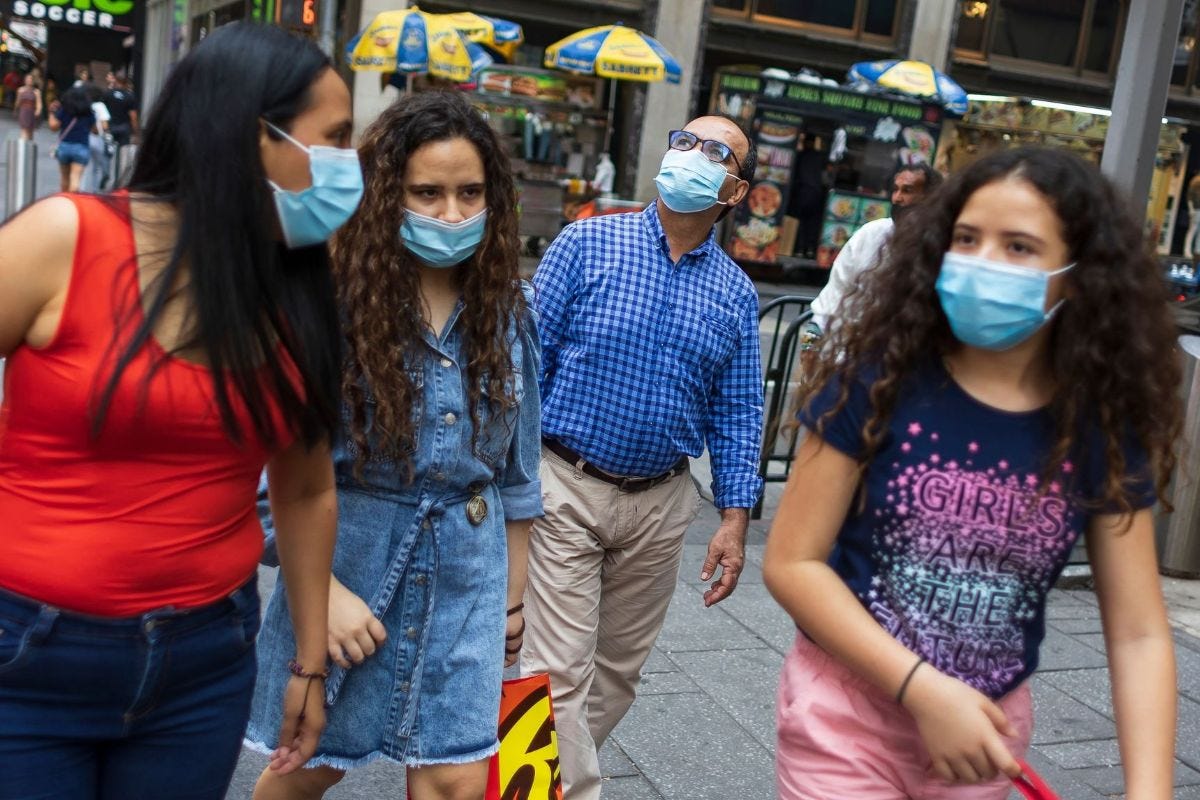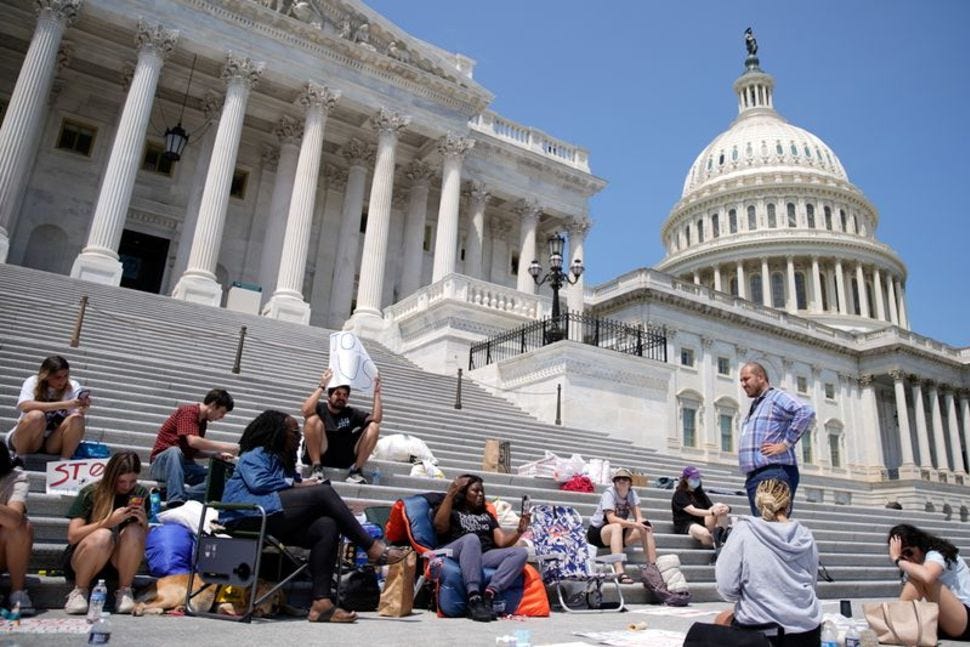Wake Up To Politics - August 2, 2021
Wake Up To Politics: Current state of the pandemic, by the numbers
Good morning! It’s Monday, August 2, 2021. Election Day 2022 is 463 days away. Election Day 2024 is 1,191 days away.
Happy August! In today’s newsletter: the top stats to understand where the pandemic stands, a deep dive into the fight over the eviction moratorium, an update on infrastructure, and more.
The current state of the pandemic, by the numbers
As the COVID-19 pandemic reaches a confusing new stage — with cases, but not deaths, soaring after a brief summer respite — Americans are struggling to re-orient their risk calculations around the virus.
There are plenty of anecdotes out there that might inform your decision-making: hospitals reaching capacity, dying patients regretting their choice not to get vaccinated, businesses requiring the vaccine.
But I thought it might be helpful this morning to focus on the hard data showing where the pandemic currently stands. Here’s the current story of COVID-19 in the United States, as told by the numbers:
— The U.S. is inching towards having 70% of adults at least partially vaccinated. 69.9% of U.S. adults have had at least one vaccine dose, just short of the goal President Biden hoped to meet by July 4 — almost a month ago. Of the total population, 191.5 million Americans (57.7%) are at least partially vaccinated, while 164.8 million (49.6%) are fully vaccinated. (CDC)
— New infections are increasing across the country. The 7-day average of new cases stood at 79,763 on Sunday, a more than 500% increase from where it stood a month before. The rise is largely fueled by the Delta variant, which is about 50% more contagious than the previously dominant Alpha variant. (New York Times / Wall Street Journal)
— But deaths from COVID-19 have remained stagnant. That is largely because those vaccinations have been much more prevalent among those Americans most at risk from the virus: 90% of Americans aged 65 or older have received at least one vaccine dose. (CDC)

— Cases are particularly concentrated in places with low vaccination rates. Florida, with a middling vaccination rate, has become the epicenter of the latest wave of cases and is responsible for 1 in 5 new infections in the country. The state reported 21,683 new cases on Friday, its highest one-day total since the pandemic began. (Washington Post)
— But as cases have risen, so has vaccine demand. Almost 857,000 vaccine doses were administered on Friday, the highest single-day total in a month. Many states that have been hit hard by the Delta variant have seen large vaccine surges: Louisiana, for example, experienced a 114% increase in vaccine uptake last week. (Washington Post)
— And the vaccines are working. 99.923% of fully vaccinated Americans have not tested positive for COVID-19, 99.996% of fully vaccinated Americans have not been hospitalized with the virus, and 99.999% of fully vaccinated Americans have not died of the virus. (Axios)
— The latest case surge has dampened American optimism about the pandemic. In June, a record 89% of Americans said the COVID-19 situation was getting better, while only 3% said it was getting worse. A new poll released this morning found that 45% said the situation is getting worse, while 40% said it was getting better. (Gallup)
The latest on the eviction moratorium
By Wake Up To Politics economics contributor Davis Giangiulio:
The pandemic-era eviction moratorium has expired after the Biden administration made a hectic last-minute push to extend it further. When the CDC extended the moratorium through July, the agency said it was going to be the last time. Then a Supreme Court ruling came out upholding the order, but Justice Brett Kavanaugh was the deciding vote and said he only upheld the moratorium because it was set to expire July 31. President Biden opted against extending the order, explaining that it would likely be struck down by the Supreme Court anyway.
The White House instead released a statement calling on Congress to extend it, citing “the recent spread of the Delta variant.” House Democrats scrambled to see if they could muster the votes to pass something, even though Senate passage was uncertain. However, the effort quickly failed amid opposition from moderate Democrats and Republicans in the House.
Democratic leaders released a statement on Sunday passing the baton back to Biden and urging him to extend the moratorium. Progressive lawmakers have complained that the president and congressional leaders did not push hard enough for an extension, with one congresswoman even sleeping on the steps of the Capitol in protest.

With the moratorium gone, 7.4 million renters behind on payments now face the threat of eviction for the first time since March 2020. That’s according to the U.S. Census Bureau, whose last survey was taken over the last week of June and the first week of July. In the same survey, 3.6 million renters said they were somewhat or very likely to be evicted in the coming months. Data from The New York Times shows that states in the deep South are likely to be most affected, with many counties there having 20 percent-plus of their renting populations behind on payments.
Further complicating the end of the eviction ban is that most Emergency Rental Assistance relief funds have yet to be spent. Local governments had distributed just around 6 percent of the money through June, according to the Treasury Department. An NBC News analysis showed that 26 states have distributed less than 10 percent of their funds, and combined with states having to deal with a backlog of applications for assistance it’s making getting money out difficult.
Scott Spivey, executive director of the Mississippi Home Corporation which oversees rental assistance funds for the state, said it is in the best interests for landlords to wait until the funds come so they can still be entitled to receive rent that they were already due. His message to landlords? “Do not evict.”
The Rundown
More top stories to know.
INFRASTRUCTURE: “Senate Democrats and Republicans unveiled on Sunday a roughly $1 trillion proposal to improve the country’s roads, bridges, pipes, ports and Internet connections, setting in motion a long-awaited debate in the chamber to enact one of President Biden’s economic policy priorities.” Washington Post
More from the Post: “The package arrives after weeks of haggling among a bipartisan bloc of lawmakers, who muscled through late-night fights and near-collapses to transform their initial blueprint into a roughly 2,700-page piece of legislation. The fate of their labors now rests in the Senate, where proponents of infrastructure reform have little margin for error as they race to adopt the sort of bill that has eluded them for years.”
MONEY RACE: “Despite departing from office and being barred from the leading social media platforms, former President Donald J. Trump was the Republican Party’s most dominant fund-raiser in the first half of 2021 and ended June with a war chest of more than $100 million, according to new federal campaign filings made this weekend.” New York Times
NOT SO FUNNY: “House Minority Leader Kevin McCarthy joked at a Saturday night event that it ‘will be hard not to hit’ House Speaker Nancy Pelosi with the speaker's gavel if Republicans take control of the chamber in the 2022 midterms and he becomes speaker.” CNN

Daybook
What’s happening in Washington today. (All times Eastern)
Executive Branch
→ President Joe Biden will receive his daily intelligence briefing at 10 a.m. from Camp David, the presidential retreat in Maryland. At 12:30 p.m., he will return to the White House. At 1:15 p.m., Biden will receive a briefing from the White House COVID-19 Response Team on the pandemic and vaccinations. At 6:45 p.m., he will deliver remarks at a virtual fundraising event for the Democratic National Committee (DNC).
→ Vice President Kamala Harris will join Biden for his 1:15 p.m. briefing on COVID-19.
→ Secretary of State Antony Blinken will deliver remarks at 2 p.m. to announce an expanded refugee program that will broaden the pool of Afghan nationals eligible for relocation to the United States.
→ White House Press Secretary Jen Psaki will hold her daily press briefing at 1 p.m.
→ U.S. public health officials will hold a COVID-19 press briefing at 4 p.m.
Legislative Branch
→ The Senate will convene at 12 p.m. and resume consideration of H.R. 3684, the legislative vehicle for the bipartisan infrastructure package. Roll call votes are possible later in the day.
→ The House is not in session.
Judicial Branch
→ The Supreme Court is on recess until October.
Thanks for waking up to politics! If you enjoy reading this newsletter, I’d be so grateful if you’d consider donating to help support me and my work. If you want to show off your support for Wake Up To Politics, you can also buy some merchandise.
Also: don’t forget to tell your friends and family to sign up for the newsletter using your unique referral link. And if you have any questions or comments, feel free to email me at any time.



